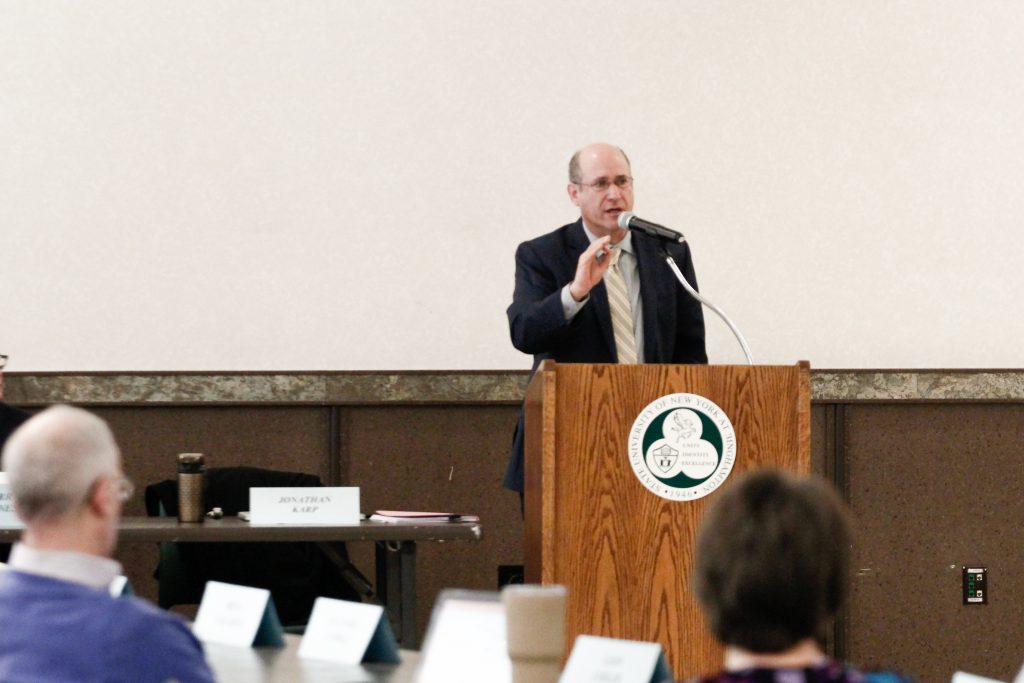As of last month, the Faculty Senate passed a resolution recommending the establishment of a temporary committee at Binghamton University charged with examining and reviewing the hiring process for assistant professors, as well as the work being done by the Transdisciplinary Areas of Excellence (TAE).
There are currently six TAEs that deal with contemporary issues such as human rights, data science and sustainable communities while fostering faculty relationships within different disciplines. At the beginning of the semester, the TAE Evaluation Committee and Joint Task Force on Transdisciplinary and Interdisciplinary Work, both established by the Faculty Senate, recommended the creation of a joint committee to oversee the governance of the TAE and the execution of the recommendations from both panels.
Jonathan Karp, chair of the Faculty Senate and an associate professor of history and Judaic studies, wrote in an email that he believes the creation of a committee is necessary and that it will exceed the recommendations given by the Faculty Senate.
“After deliberation, the Faculty Senate Executive Committee passed a resolution to create a temporary committee that would have among its tasks to consider the recommendations of both reports and, hopefully, to synthesize them,” Karp wrote. “The temporary committee would also identify any additional issues of concern not covered explicitly in the two reports.”
The creation of the committee primarily pertains to tenure and promotion processes for faculty involved in a TAE. Having been directed by the Faculty Senate to provide written guidelines specifically outlining their role for tenure and promotion, TAEs should be having set priorities for hiring and how they should be engaging with hiring committees. The committee will also be looking at the issues and concerns in relation to interdisciplinary and transdisciplinary programs, teaching, scholarships and hiring practices, according to the Faculty Senate’s resolution to create the committee.
“The Faculty Senate and the Faculty Senate Executive Committee both strongly support transdisciplinary and interdisciplinary research and teaching,” Karp wrote in an email. “We believe the TAEs reflect Binghamton University’s strong commitment to these approaches.”
Established in 2013, the current TAEs are citizenship, rights and cultural belonging, data science, health sciences, material and visual worlds, smart energy and sustainable communities. Each TAE is made up of a faculty committee of 12 to 15 members, who work to identify new faculty positions needed to support the work TAEs do, participate in the recruitment of more TAE faculty, offer competitive seed grants and organize workshops and conferences to encourage research, according to BU’s website.
John Kuhn, a member of the steering committee for the material and visual worlds TAE and an assistant professor of English, said he believes the work of the steering committees, and anything that will expand on the TAEs’ work to encourage research, is important to the campus community’s growth.
“We have periodic meetings where we talk about bringing speakers to campus, there’s a graduate student working group that we coordinate, we administer seed grants, hosting faculty interdisciplinary conversations around certain topics and more,” Kuhn said. “It’s really important — I’ve been really happy with the kind of intellectual community that the TAEs designed to build.”
The committee will also decide within the year whether or not there needs to be a permanent committee established to oversee TAE, according to Barry Jones, chair of the Faculty Senate Executive Committee, chair of the economics department and a professor of economics.
“We felt that a temporary committee would be a necessary start because it could determine the responsibilities and purview of a possible permanent ‘standing’ committee and decide in a short time whether such a committee would be necessary and appropriate,” Jones wrote in an email.



